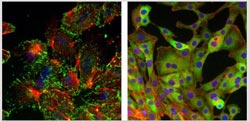Researchers Discover Master Regulator in Cancer Metastasis

Mammary epithelial cells that have undergone an epithelial-mesenchymal transition (EMT) (left image), exhibit a change in cell morphology with actin stress fibers (red) and with focused cell adhesion points (green). In mammary epithelial cells in which the Sox4 transcription factor is missing (right image), this change is not apparent, and cancer cells cannot metastasize.<br>Image: Dr. Nathalie Meyer-Schaller, University of Basel<br>
This finding is reported by researchers from the University of Basel and from the Friedrich Miescher Institute in Cancer Cell. Inhibition of Sox4 and subsequent processes may prevent metastasis in cancer patients.
The predominant cause of death in cancer patients is metastasis, the formation of secondary tumors in other organs like the brain, liver, and lungs. Cancer cells detach from the original primary tumor and reach a single cell or group of cells in another organ. The cells of the body normally remain in place through adhering to an extracellular substance. However, cancer cells learn how to release themselves from these bonds and invade surrounding tissues, blood, and the lymphatic system.
The transformation of sedentary, specialized cells into wandering, invasive, and unspecialized cells is called epithelial-mesenchymal transition (EMT), which is central to metastasis. EMT is a multistage process, which is accompanied by a fundamental change in cell morphology and number of genetic programs. The molecular processes that govern EMT, however, are still poorly understood.
Main Switch Found
The research groups of Prof. Gerhard Christofori of the Department of Biomedicine at the University of Basel; Prof. Erik van Nimwegen from the Biozentrum, University of Basel; and Prof. Dirk Schuebeler from the Friedrich Miescher Institute have discovered a master regulator of EMT and metastasis: the transcription factor Sox4 is upregulated in its activity and triggers the expression of a number of genes that play an important role during EMT and metastasis.
In particular, Sox4 promotes the expression of the enzyme Ezh2, a methyltransferase, which generally influences methylation of specific proteins (histones), the packaging of the genetic material, and thus its readability and gene expression. Due to this change in genetic information, the behavior and function of cells are reprogrammed – a process that is currently observed during metastasis. Such a change in gene expression is also found in patients with malignant cancer and metastasis and correlates with a poor prognosis.
These findings point to the possibility that the inhibition of the transcription factor Sox4 and especially the methyltransferase Ezh2 could hinder metastasis in cancer patients. Appropriate medications are currently being developed but they need to undergo clinical trials before being used in patients. The research was implemented within the framework of the SystemsX.ch-RTD Project „Cell Plasticity.”
Original Citation
Neha Tiwari, Vijay K. Tiwari, Lorenz Waldmeier, Piotr J. Balwierz, Phil Arnold, Mikhail Pachkov, Nathalie Meyer-Schaller, Dirk Schübeler, Erik van Nimwegen, and Gerhard Christofori (2013)
Sox4 Is a Master Regulator of Epithelial-Mesenchymal Transition by Controlling Ezh2 Expression and Epigenetic Reprogramming
Cancer Cell, Volume 23, Issue 6, 768-783, 10 June 2013 | doi: 10.1016/j.ccr.2013.04.020
Further Information
Prof. Dr. Gerhard Christofori, University of Basel, Department of Biomedicine, Mattenstrasse 28, 4058 Basel, Switzerland. Tel. +41 61 267 35 62, Tel. +41 61 267 35 61 (secretary), E-Mail: gerhard.christofori@unibas.ch
Weitere Informationen:
http://dx.doi.org/10.1016/j.ccr.2013.04.020
– Abstract
http://biomedizin.unibas.ch/about-us/people/profil/profile/person/christofori
– Christofori Research Group
Media Contact
More Information:
http://www.unibas.chAll latest news from the category: Life Sciences and Chemistry
Articles and reports from the Life Sciences and chemistry area deal with applied and basic research into modern biology, chemistry and human medicine.
Valuable information can be found on a range of life sciences fields including bacteriology, biochemistry, bionics, bioinformatics, biophysics, biotechnology, genetics, geobotany, human biology, marine biology, microbiology, molecular biology, cellular biology, zoology, bioinorganic chemistry, microchemistry and environmental chemistry.
Newest articles

Superradiant atoms could push the boundaries of how precisely time can be measured
Superradiant atoms can help us measure time more precisely than ever. In a new study, researchers from the University of Copenhagen present a new method for measuring the time interval,…

Ion thermoelectric conversion devices for near room temperature
The electrode sheet of the thermoelectric device consists of ionic hydrogel, which is sandwiched between the electrodes to form, and the Prussian blue on the electrode undergoes a redox reaction…

Zap Energy achieves 37-million-degree temperatures in a compact device
New publication reports record electron temperatures for a small-scale, sheared-flow-stabilized Z-pinch fusion device. In the nine decades since humans first produced fusion reactions, only a few fusion technologies have demonstrated…





















